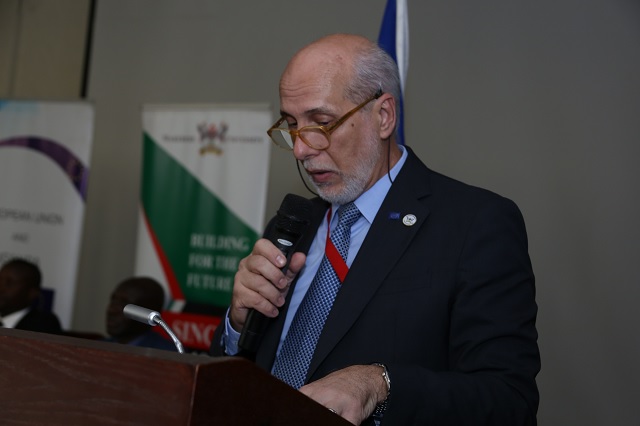
Kampala, Uganda | THE INDEPENDENT | The European Union Ambassador to Uganda, Attilio Pacifici has called upon the government to abolish the death penalty in order to enhance human dignity and promote development of human rights.
Pacifici was giving a keynote address at the commemoration of the World day against the death penalty at the International Law Reform offices in Munyonyo, Kampala. The day is marked internationally every 10th of October to advocate for the abolition of the death penalty in the world.
The ambassador said no one needs or deserves to die and that educational programs offered in prisons and other rehabilitation services are good examples that not all is lost once one is admitted to such an institution.
“History has also shown that death penalty does not deter crime more effectively than other punishments and that the abolition of the death penalty does not lead to an increase in crime,” said Pacifici
He adds that no justice system is perfect and that errors happen and innocent people are sentenced to death. There are currently 123 inmates on death row in Luzira, three of whom are women. Although Uganda is considered a defacto abolitionist since it last administered a civilian execution in 1999 and a military execution in 2005, President Yoweri Kaguta Museveni, who is required by law to sign before the penalty is administered has often threatened to resume administering death penalty causing alarm among activists against death penalty.
The first Counselor of the French in Uganda Jean Francois says the struggle against death penalty is a hard one but necessary. He says when France abolished the death penalty in 1981, commentators said there would be an increase in crime but this has not been the case.
“And it is important to note that at that time in 1981, it was not easy at all, it was not an easy thing. The majority of the population was against the abolition of the death penalty,” said Francois.
The Ambassador of Netherlands to Uganda Karin Boven, also reiterated the call for the abolition of the death penalty. She spoke in particular about women on death penalty saying they are often victims of domestic violence who sometimes commit murder after being subjected to discrimination and abuse.
She says sentencing a woman to death is sentencing her children to death. She asked government to consider investigating domestic violence in cases where women are accused of murder especially of their partners. A 2021 survey by the International Law Reforms Organisation found that that more than 80 percent of the five percent of women in prisons are accused of murder.
Justice David Batema who has been a strong judicial advocate against gender based violence and domestic violence says that a number of women accused of murder are victims of domestic and gender based violence and yet courts do not pay a lot of attention to such history while prosecuting cases of alleged murder. For example, Justice Batema says that the law requires that one uses a defence of self defense when they have been assaulted.
This means that if a woman is abused and her rights violated by say her partner and she commits murder, if the day she committed murder she had not been abused then she can’t use a defence for self defense.
Justice Batema hence says court defines provocation in line with an immediate act yet in cases of domestic violence, women are provoked for long before they finally react. “Under the English law which we adopted, you must have lost your temper in the hit of passion and killed when you’re enraged” said Batema that this is when one can use a defence of provocation.
Doreen Namyalo Kyazze, the head of International Law Reforms Organisation in Uganda asked government to ratify the second protocol to the International Covenant on Civil and Political Rights aims at the abolition of the death penalty.
The covenant was created in December 1989 and entered into force on 11th July 1991. As of April 2021, the protocol had 90 state parties including 24 from Africa. 16 countries in Africa have not yet abolished the penalty. Uganda has 28 offences that merit the death penalty.
*****
URN
 The Independent Uganda: You get the Truth we Pay the Price
The Independent Uganda: You get the Truth we Pay the Price



